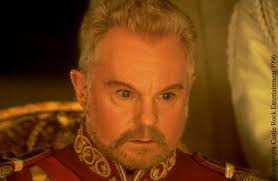Control Freak - An essay about control, Hamlet, and video games.
By aiomon 3 Comments
Control Freak
Theatre and video games are surprisingly similar art forms. The most notable of their similarities being their defining flaws: they are both known to be artificial. Unlike most art forms, theatre can never be realistic by virtue of the fact that the things portrayed cannot ever be real, and likewise, even the most immersive of video games leave the user with the realization that the act of playing the game is an artificial experience. In theatre, this is referred to as "staginess" and refers to the obviously fake (or staged) aspect of a performance. The viewer must allow themselves to overlook this, and buy into the medium for full effect. Likewise, in video games, this is called "ludonarrative dissonance" (a phrase many hate). Ludic means spontaneous or undirected playfulness and the phrase refers to the actions of the player being dissonant, or inconsistent, with the narrative of the experience. Video games must be enjoyable as an experience, but many also maintain a linear narrative. This presents issues when a player's internal story does not match the written narrative, or the actions that the player is performing are inconsistent with the narrative presented. As games let the user experience a story, players tend to create their own understandings for the context in which a narrative exists, and ludonarrative dissonance, like staginess, is a disconnect between internal understanding of a universe or narrative, and the written universe or narrative.
One of the many ways ludonarrative dissonance can be presented is through the removal of control or freedom. When a player is interacting with a game, his actions have intense and intimate meaning because it feels like the user is creating the experience he is having, and when the game removes the illusion of choice or control from the user in any form, the illusion of agency is broken. This can lead to the player feeling uncomfortable with the direction of the narrative, or frustrated. Something that the user once felt he had the ability to create and mold is now known to be a directed experience. In Hamlet, by William Shakespeare, Hamlet experiences a similar effect to that of ludonarrative dissonance, as control is given and removed from him and his internal understanding is disconnected from the reality surrounding him. He finds that he has immense control to manipulate certain situations and in others he is totally powerless. When Hamlet is totally free to act as he wants, he is at a peak as an individual, and when he has no control or his internal understanding does not match reality, Hamlet is frustrated, depressed, and has no purpose. When Hamlet is studied through the lens of video games, the importance of control, freedom, power and internal consistency on one's ability to find meaning and happiness becomes apparent.

In Hamlet's first scene, the loss of purpose that arises from loss of control and freedom is demonstrated through Hamlet's apparent inability to act on his thoughts. When Hamlet is introduced, his father has just died, his uncle is on the throne and his mother has married his uncle. He despises all of these events, and his frustration is evident in his soliloquy, when he says, "How weary, stale, flat and unprofitable seem to me all the uses of this world (Shakespeare, 1.2.139)." The world no longer holds value for Hamlet, and the statement concisely summarizes his feelings. Not only does the world hold no value, but it requires massive mental exertion for him to even carry on living, as we can tell through his use of the words weary, stale and flat. He ends the line with unprofitable, showing how he thinks that no good can ever come of the situation in which he finds himself. However, the root of this emotion is revealed in another line, when he says, "Or that the Everlasting had not fixed His canon 'gainst self slaughter! Oh God, God" (Shakespeare, 1.2.136-138). Hamlet is saying that if it were not against the law of God for him to kill himself, he would not hesitate to do so. A common reason for consideration of suicide is loss of control. When an individual has no power over anything occurring in his life, the one thing that he will always have power over, is whether to live or die. Hamlet confirms that his lack of control is the greatest factor in his depression when he says "It is not, nor cannot come to good. But break, my heart, for I must hold my tongue." In this line, Hamlet claims that the situation is terrible, but also claims that it can never get better, because he cannot say anything. He knows he has no power to do anything or act on his thoughts, and understands that if he has no control, he will never be happy. In this scene, Hamlet is an observer, not a player. He is an observer because he is forced to watch the outcomes unfold, with no agency to control what occurs. Hamlet's situation as an observer is analogous to a video game player. Even in such a limited and artificial form, lack of control draws a huge negative response from video game audiences. Games journalist and critic, Mitch Dyer says "... branching evolution became the only acceptable standard, the lowest-level expectation; without such freedoms, games with guidance felt restrictive... When a game forces your hand, you wind up walking a predictable path where you're at the mercy of an author's intent (Dyer)." This statement makes sense in the context of video games, but also in the context of human nature. Dyer is commenting on freedom and control, and his statement makes obvious that loss of control is negative. In the context of games, lack of control is detrimental to the experience, as it removes the purpose from the player: if one is not controlling the events, one truly has no purpose, and one becomes an observer. While experiencing a story passively is not an inherently negative thing, if one feels like one has personal a motive, and the control is taken away, the experience of control loss is negative. This is precisely what Hamlet is experiencing. He has no control, and he feels as though he has no purpose. He does not understand why he is alive to be a player in the game of life, if he has no ability to influence the things he cares about. Human nature remains consistent, and the loss of purpose when freedom and control are removed are demonstrated through both Hamlet's speech and in critical response to video games.
The disconnect between Hamlet's understanding and reality causes him inability to commit to what he believes and act on his thoughts. Power to manipulate a situation is granted by understanding and knowledge of what one can do. Hamlet experiences disconnect between what he thinks, and the world around him. In scene one of Hamlet, the image of Claudius is inconsistent. Hamlet hates his uncle, which is evident from his first line, the moment he mutters "Little more than kin, and less than kind (Shakespeare, 1.2.66)." As soon as Hamlet is introduced, we known Claudius to be a villain in the eyes of the prince. However when Claudius addresses his court, saying "Your better wisdoms, which have freely gone with this affair along (Shakespeare, 1.2.16)." it is clear that the court seems to have deep respect for the king, and that Claudius is a just and balanced ruler. This disconnect between Hamlet's thoughts and the narrative of the court are effectively ludonarrative dissonance, as experienced by video game players. Clint Hocking, a game developer, made a statement regarding the most acclaimed game release of 2009, Bioshock: "... the game seems to openly mock the player for having believed in the fiction... leveraging the game's narrative structure against its ludic structure all but destroys the player's ability to feel connected to either (Hocking)." This quote expresses how written narrative themes strongly contradict the actions of the player, and as a result, Hocking found he couldn't connect to either. Effectively, as the player, it was the story that he created through playing the game that had such great dissonance with the plot. The concept of a narrative being so disconnected with the actions or thoughts of an individual are very similar to what Hamlet experiences. The blatant contradiction of the court, to his views of the king remove his ability to connect or act on either idea. We see this throughout the entire play, as Hamlet always seems to need more proof, reassurance that he is correct. For example, when he needs to put on an "antic disposition" to ensure that Claudius is guilty rather than just acting on what he knows to be true. This need for reassurance stems from Hamlet's understanding of the king. He believes that Claudius is a terrible person, while the context of reality tells him that he is a balanced man. Hamlet cannot fully accept either of these truths because they both seem to be correct, much like a video game player is unsure whether to commit to the written narrative, or the narrative of their actions as a player. Disconnect between Hamlet's understanding of the king and his understanding of reality, much like disconnect between a narrative and ludic actions of a video game player, demonstrate the power of mental consistency on one's ability to freely act and have control.

The positive impact that control can have on an individual is displayed when Hamlet first becomes an active player. In Act 1 Scene 5, Hamlet has an encounter with the ghost of his father. Until this point, Hamlet has been an observer, watching events unfold before him, with very little ability to influence. However, as the ghost reveals that Claudius killed his father, mental narrative is aligned with the narrative of the world, and he becomes a player for the first time. "As I perchance hereafter shall think meet To put an antic disposition on." is the phrase Hamlet says when has decided that he will take a more active role. Until this point, the only facets of Hamlet portrayed are his anger, depression and shock but with this line he reveals that he has a plan: he will act mad. While the intention of this plan remains unknown, he has decided to do something, and has given himself control. For the first time Hamlet is in a more positive mindset. He says nothing of death and despair, but rather says "With all my love...express his love and friendship to you... (Shakespeare, 1.5.205-207)". He talks of love and friendship when his control is realised, and the positive impact in Hamlet's disposition is apparent. In video games, control has a similar effect: it is liberating and positive. Jeff Haynes, a journalist says, "Dragon Age frequently presents you with options that can radically change... the world, and some can even alter the overall story. Even the smallest decision ... is both daunting and exhilarating (Haynes)." The happiness that is described by Haynes in reference to meaningful choices is clearly displayed in Hamlet. Despite this drastic change in mood, nothing has changed. If anything, his situation has gotten worse as he now knows his uncle to be a murderer. The only thing that has changed, is Hamlet's transition to a player, from an observer. The joy that the player feels in a game, is directly proportional to the player's ability to influence the world, and the shift in Hamlet's character is also rooted in his discovered control. The positive impact of control is displayed when Hamlet finds the freedom to act, and in critical response to narrative control in video games.

The conclusive power of freedom and control are demonstrated when we examine how giving an observer control to act, but changing nothing else, can provide a positive experience. In most games, the user is not truly a player, but rather a medium to advance a predetermined narrative. The user is merely a glorified observer. However, more recently, the benefits of allowing a player to have real control in a game have been realised, and games allowing narrative freedom have been met with huge acclaim. Hamlet has been in the position of glorified observer for much of the play, as he must only witness his surroundings with no power to make them stray from their course, but when he transitions to a true player, a positive response is generated. In the video game Skyrim, the user never has to follow a determined story. The world exists, and the player has the agency to explore and create his own narrative. Charles Onyett gave the game a glowing review saying "... thrilling sense of freedom... thrilling freedom of choice ... Skyrim is a rare kind of intensely personal, deeply rewarding experience, and one of the best role-playing games yet produced (Onyett)." Skyrim doesn't have a strong linear narrative, or any defining factors that set it apart from other games, but the positive response it received from critics and fans was significant. Freedom and the ability to make meaningful choices alone are what garnered the positive feedback. The positive experience Hamlet has when he has control in Act 2 Scene 2 is unparalled by anything seen previously in the play. In the scene, Hamlet is toying with Polonius, threatening him and subtly putting his plan to deal with Claudius into action. The power he has translates directly into his emotional state. In many stagings of the scene we see excitement and happiness exude from Hamlet. In Kenneth Branagh's Hamlet, Hamlet is laughing, giddy and more animated than he has ever been. However, nothing aside from his transition to a player from an observer has changed. Similarly, very little in Skyrim sets it apart from other games, besides the control and agency it allows the player, and in Hamlet, nothing but the control and agency of Hamlet has changed: his uncle is still king, his mother is still married to his uncle, his father is still dead. It is merely the ability to manipulate the situation that brings Hamlet, and Skyrim players contentment. Ability to influence a situation is a key variable in one's self happiness, which become apparent when one examines how giving an individual control can change his outlook.

We see Hamlet at the peak of his exuberance and humanity when he has the most power, and makes the meaningful choice to act. When Hamlet deals with the players in Act 2 Scene 2 , he has the most power he has had up to that point. He is controlling the fate of the king, through his plot to bring about Claudius' demise and he has the power to control the players, a crowd of people with whom he is very comfortable. He is making a meaningful choice to have power, and it is clearly demonstrated in his character. When Hamlet addresses the players, saying "Welcome, good friends. - O my old friend! (Shakespeare, 2.2.445) it is evident that it is more than just comfort with the players that he is experiencing. We have seen Hamlet with cherished friends before (in Act 1 Scene 5 for example), and he has never been as ecstatic as he is now. He is happy, because he finally sees his control manifesting in a real situation, and he is making the conscious choice to act. Brice Morrison wrote a case study about meaningful choice in video games on Gamasutra and observed "Meaningful choice requires the four following components: Awareness... Consequences... Reminders... Permanence... All four of these components satisfied then we have a recipe for meaningful choice in games. The reason that this is true, is that these are the components of a meaningful choice in real life... Evoke a strong emotional reaction, something that players will discuss, think about, and remember (Morrison)." Obviously in the context of video games, thought, discussion and remembrance are positive things: it means that the experience was worthwhile and good. In order to truly forge a emotional experience, choice is crucial. To make a meaningful choice, one needs to be given control, one needs to take the role of a player, not an observer. Meaning relies on choice, and to have choice, you need to have power and control over a situation. Human's need meaning to be happy, which can only be obtained by having control. Power grants the ability to make meaningful choices which is displayed in Hamlet and through emotional response to video games.

If one's ability to be happy and find meaning is so directly tied to power, power being removed should cause a negative response from an individual. This can be observed when power is removed from an individual, and he is forced into an observer role, when he is accustomed to being a player. We see this in Claudius, when Hamlet confronts him after Polonius has been killed. Hamlet has all the power in this scene. He has nothing to lose as he is already being deported to England, and at any time he can expose Claudius as a murderer. Claudius has changed from being the most powerful character in Denmark, to having no power, as if he says anything to offend Hamlet, he risks his deed being exposed. He has transitioned from a player, to an observer, and the frustration he experiences is evident. In many renditions of the scene, Claudius cracks, and lashes out at Hamlet. In Branagh's Hamlet, Claudius loses his temper when Hamlet refuses to provide him information, and he slaps Hamlet and shouts "Where is Polonius (Shakespeare, 4.3.36)!" He is experiencing the disconnect between his status and how he is being treated and is also experiencing loss of control, as he is used to having all the power. He believes that he cannot be defied, but Hamlet is actively withholding information from him. This disconnect between reality and his mental state, paired with his lack of ability to do anything about it cause him severe stress and paranoia. As soon as all the others have left the stage, Claudius reveals his plot to have Hamlet killed and says, "... The present death of Hamlet. Do it, England, For like hectic in my blood he rages, And thou must cure me. Till I know 'tis been done, Howe'er my haps, my joys were ne'er begun. (Shakespeare, 4.4.74-78)." Claudius reveals that ever since Hamlet has begun to take control of his own fate, he has never been able to have peace of mind. As his power diminishes, and Hamlet obtains more control, he feels threatened. Claudius also explains that he will never be able to be happy until Hamlet is dead. Claudius knows that as long as Hamlet is alive, he has no power. There is always constant threat of being exposed as a murderer, and he has no control over Hamlet, as long as Hamlet is alive to tell the truth. This absolute removal of power exists in video games too. Tom Francis, a prolific writer and developer, commented about the game Call of Duty: Black Ops, and the lack of agency, complaining, "The downside is that it punishes you any time a scene doesn’t play out as the director intended. It’s like being in an action movie, certainly, but one where the writer won’t tell you the script... and the director yells “Cut!” every time you fail to read his mind. Here’s an idea, guys: make a f***ing film... come back to games when you’re ready to give the player even the illusion of control (Francis)." When games lack the ability to make meaningful choices, there is a huge disconnect. As a video game user is interacting with the game, it feels like there should be some room to have control over the events, but in the case of Call of Duty, this was evidently not the case. Francis is used to having power and agency in games, and when it is stripped away, he found the experience very frustrating. Francis describes a frustration that is analogous to Claudius. Both are accustomed to having power to have agency over the events occurring, but now find that their power is diminished, and they have no choice but to become observers. Removal of power causes huge frustration, and for an individual to be happy and find meaning, there needs to be an outlet to determine one's own fate.
Being a player versus being an observer is a theme that all people will experience in life. Video games have become exceedingly popular in the past decade, and it may be because people seek to have control. In other art forms, such as film or literature, the user has no way to change the narrative. This lack of freedom to control can cause frustration, when the protagonist or characters do something that is disconnected with the users understanding of the established reality. Video games allow for control, and this agency over narrative is a deeply personal experience that can only be experienced in the medium of games. Control provides the ability to find resonance with a universe and one's own internal thoughts and understandings, and this freedom provides meaning and happiness to the user. Human nature remains consistent, and what is rewarding in the limited sphere of video games persists in the real world. Human need for control is demonstrated by Hamlet too, as he struggles to find meaning and happiness, which he only finds through self determination and action. Having control and self determination is a positive experience, and being stripped of control is frustrating and demoralizing. Through study of the characters in Hamlet, it becomes apparent that control has positive and negative influence on an individual, and even through the simulated and artificial confines of a video game, the significance of control is obvious.
Bibliography
Dyer, Mitch. "Linear Games and the Art of Control." IGN. N.p., 24 Apr. 2012. Web. 18 Dec. 2013.
Hocking, Clint. "Click Nothing." 'Click Nothing' N.p., 7 Oct. 2007. Web. 18 Dec. 2013.
Haynes, Jeff. "Dragon Age: Origins Review." IGN. N.p., 3 Nov. 2009. Web. 18 Dec. 2013.
Onyett, Charles. "The Elder Scrolls V: Skyrim Review." IGN. N.p., 10 Nov. 2011. Web. 18 Dec. 2013.
Morrison, Brice. "Gamasutra: Brice Morrison's Blog - Meaningful Choice in Games: Practical Guide & Case Studies." Gamasutra Article. N.p., 11 Nov. 2013. Web. 18 Dec. 2013.
Francis, Tom. "PC Gamer." PC Gamer RSS. N.p., 17 Nov. 2010. Web. 18 Dec. 2013.
Shakespeare, William. Hamlet. New York: Washington Square, 1992. Print.
Hamlet. Dir. Kenneth Branagh. Perf. Kenneth Branagh. Castle Rock Entertainment, 1996. DVD.
